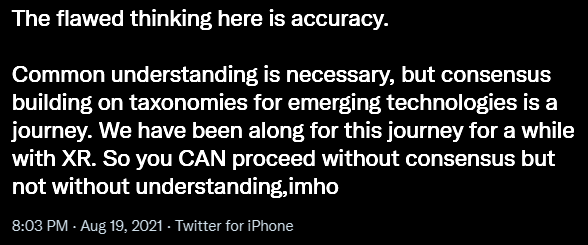
I don’t get doggedly persistent academics and venture capitalists trying to get a hard and fast definition of what the metaverse is so I decided to write this in response.

From Wikipedia, it has been defined as this -
The Metaverse is a collective virtual shared space, created by the convergence of virtually enhanced physical reality and physically persistent virtual space, including the sum of all virtual worlds, augmented reality, and the Internet. The word “metaverse” is made up of the prefix “meta” (meaning beyond) and the stem “verse” (a backformation from “universe”); the term is typically used to describe the concept of a future iteration of the internet, made up of persistent, shared, 3D virtual spaces linked into a perceived virtual universe.”
Bit of a mouthful.
Neal Stephenson refers to a convergence of physical, augmented, and virtual reality in a shared online space.
Matthew Ball states that it has to span the physical and virtual worlds; contain a fully-fledged economy, and offer “unprecedented interoperability”.
In a previous blog, I mentioned that the metaverse is a collaborative and immersive environment that should blend both the physical and virtual realms to the point that data exchange and interactions become fluid and affect each other. And in one before that, I throw around the terms Metaverse, Multiverse and Omniverse as expressions of the structure of the overall concept. Will Burns, referenced in the same post, uses terms like Galaxies to describe what I called Multiverse. Are we all wrong? Are we all correct?
Metaverse definitions are so wild right now, I’ll propose a new tagline for the movie version: “In The Metaverse, everyone can hear you scream.”
@avibarzeev
Who cares. They express a common understanding of the same concept in the way people think about what the metaverse represents.
The metaverse is not an equation. It cannot be described in only one set of terms. How I explain the metaverse depends on the context of the conversation because the idea of the metaverse is fluid. If it creates a common frame of reference for many then job done. I’m reminded of trying to explain artificial intelligence during a TEDx event to a crowd of 2,000 people of different ages, backgrounds and careers. If I went with a strict academic definition I’d have been met with some pretty blank faces. The metaverse is no different.
Definitions are only of interest to people who want to be considered as the one who is the last person to edit a Wikipedia page or be named in some sort of LinkedIn ‘Hall of Fame’. It is the most boring of all pub conversations and the one most likely to cause a fight after a couple of pints.
We’ve been here before with the other realities — AR, VR, MR, XR — to the point it becomes a marketing exercise for vendors and stops the industry from moving forward.

@KavyaPearlman
The problem with trying to rigidly define something that has such far-reaching consequences and impacts on society is that the metaverse will mean something different to everyone.
A brand will want to reach its audience in new ways, an educator will want to teach their students in new ways, an artist will want to create in new ways, a manufacturer will want to simulate in new ways — you simply cannot define what the metaverse is as a static ideal when every person or business may be approaching it in their own way, looking for their own meaning.
Why do you think Facebook released Workrooms as a virtual embodiment of a boring office meeting space when the metaverse is supposed to represent unlimited imagination? Because that is what’s familiar to the audience it is pitching it to.
If Zuckerberg fell into a hole and adlibbed the Wiki entry then the message and context would have been lost.
Discussions about technologies and taxonomies, architectures and infrastructures, standards and interoperability are an entirely different layer of topics that don’t need to wait for that singular definition to be uttered. Nor frankly, do they take into account any of the philosophical, economic or societal impacts which make up what a metaverse is or can become.
The metaverse will one day be viewed from personal perspectives the same way as religion is for many. That is something no academic or technologist can ever define.
I’m reminded of the Star Trek: TNG episode, The Mark of a Man, where Data is put on trial to prove whether he’s a machine and property, or whether he’s something else entirely.
That to me is a far more interesting debate to have about the metaverse than what technologies are bolted together to create it.
“It sits there looking at me; and I don’t know what it is. This case has dealt with metaphysics; with questions best left to saints and philosophers. I am neither competent nor qualified to answer those. But I’ve got to make a ruling, to try to speak to the future. Is Data a machine? Yes. Is he the property of Starfleet? No. We have all been dancing around the basic issue: does Data have a soul? I don’t know that he has. I don’t know that I have. But I have got to give him the freedom to explore that question himself. It is the ruling of this court that Lieutenant Commander Data has the freedom to choose.”
From:https://medium.com/@theo/stop-trying-to-define-the-metaverse-c0aab9130554
 Web3News
Web3News




